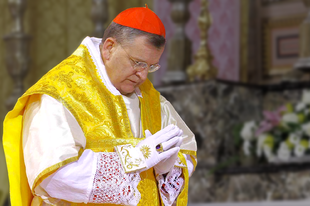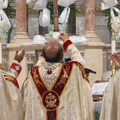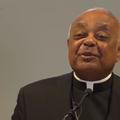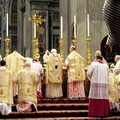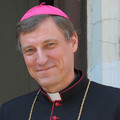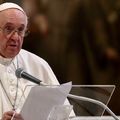It is our pleasure and a great honor that His Eminence Raymond Leo Cardinal Burke has granted an exclusive interview to the Hungarian independent Catholic news and commentary site, Katolikus Válasz.
This interview was conducted in a written form and the questions were sent to His Eminence on August 24. Due to the length of the interview, we decided to publish it in two parts. We published the first part on Wednesday, September 6.
Below is the second and final part of the interview. It includes Cardinal Burke's thoughts on
– the idea of ordaining 'viri probati' to the priesthood,
– the possible reasons of and solutions to the shortage of priests in the West,
– the correct interpretation of Amoris Laetitia with regard to the 'internal forum',
– the true meaning of 'discernment',
– why the richness and beauty of liturgical items do not contradict Christian simplicity,
and His Eminence's vision for the Church.
Kattints ide az interjúrészlet magyar fordításáért!
Miklos Szerdahelyi
editor-in-chief, Katolikus Válasz
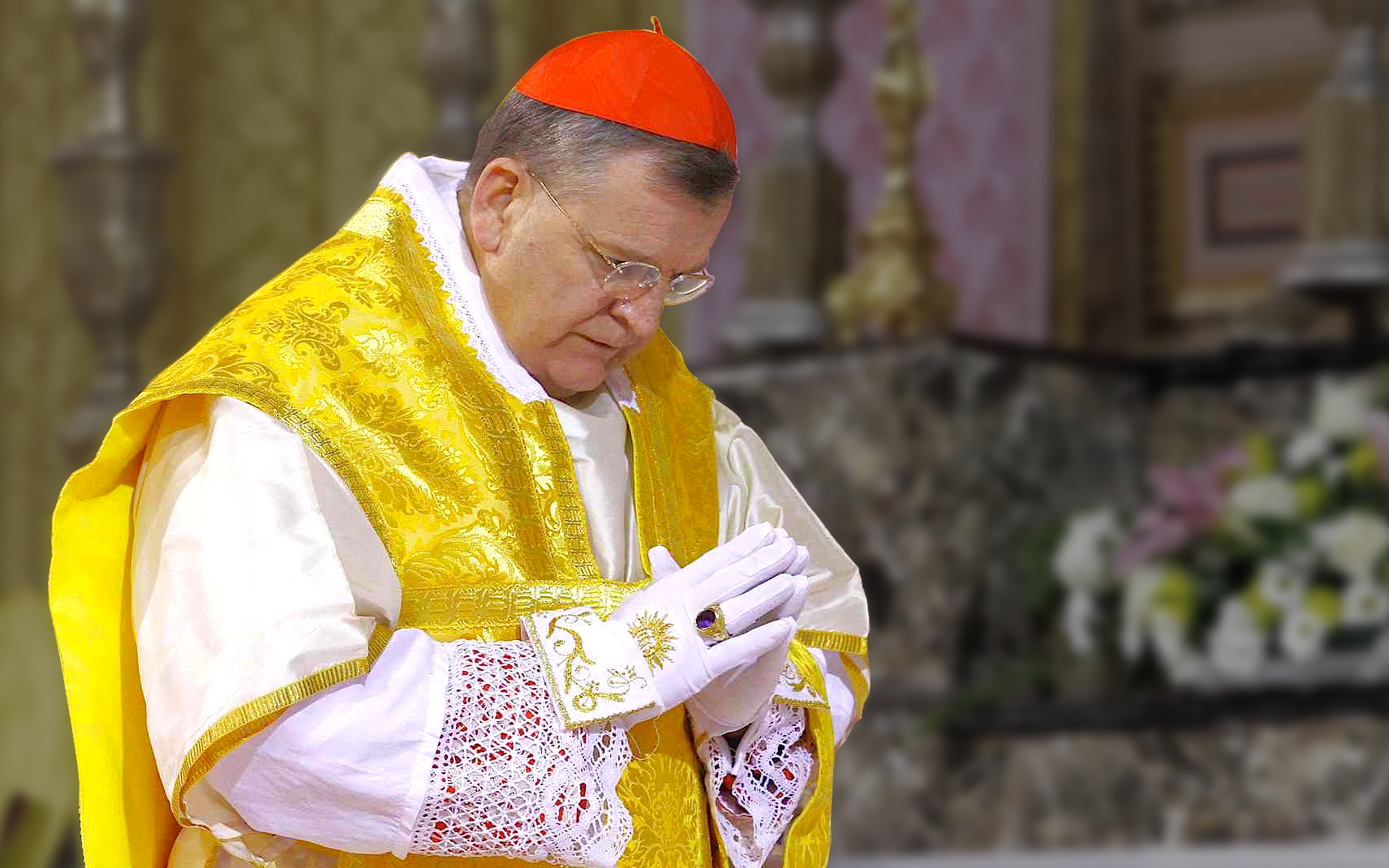 Katolikus Válasz: One of the Hungarian bishops recently said that he is about to write a letter to Pope Francis asking him to allow the priestly consecration of ‘viri probati' in the Latin Church. This has opened up a debate in the Hungarian Catholic Church about this issue and other possible solutions, including the abolishment of mandatory celibacy, to the shortage of priests in the Western world.
Katolikus Válasz: One of the Hungarian bishops recently said that he is about to write a letter to Pope Francis asking him to allow the priestly consecration of ‘viri probati' in the Latin Church. This has opened up a debate in the Hungarian Catholic Church about this issue and other possible solutions, including the abolishment of mandatory celibacy, to the shortage of priests in the Western world.
Do you think that ‘viri probati' becoming priests will happen soon in the Latin Church? Can the Eastern Catholic or even the Orthodox practice be an example for the Latin Church?
Do you think that any form of relaxation in the mandatory priestly celibacy would be a good solution for the shortage of priests in the West? What is the main reason for the decline in the number of priestly vocations in the West, and what solution would you suggest to this problem?
Cdl. Burke: No, I do not anticipate any change in the Church's discipline regarding priestly celibacy because of its roots in the example of Christ the High Priest, in whose person the ordained priest acts. It is my hope that only viri probati, in the sense in which Saint Clement of Rome first used the phrase, will be ordained, that is, men proven through an appropriate period of seminary formation. I do not anticipate the ordination of viri probati, in the sense of married men of proven virtue, according to a current use of the phrase, in the Roman Catholic Church.
The practice of the Eastern Churches regarding priestly celibacy must be understood thoroughly and deeply. It does not constitute an argument for a change in the discipline of the Latin Church. A relaxation of the discipline regarding priestly celibacy will not increase the number of vocations. A priestly vocation is a response to a divine call which includes the grace of celibacy or perpetual continence.
The reason for the lack of response to the priestly vocation is the loss of faith in our times and the lack of instruction of the young in the faith. God is certainly calling a sufficient number of young men to serve His Church. The worldliness of the culture in which we live makes it difficult for a man to hear the call.
Also, the failure of families, parish priests and other Christians to foster priestly vocations deprives those being called of an essential help in understanding and responding to the call.
Katolikus Válasz: In an interview, another Hungarian bishop interpreted Amoris Laetitia as letting pastors decide in an 'internal forum' whether to allow a civilly remarried person to receive the sacraments in the rare case when the person's first marriage was truly invalid, but it was or would be impossible to prove it (e.g. due to a lack of witnesses) to the ecclesiastical court dealing with the annulment process.
Are there really such cases where a confessor can, while an ecclesiastical court cannot obtain the moral certitude necessary for declaring a marriage invalid? Do you agree that in such a case the internal forum can legitimately recognize the invalidity of the first marriage and provide access to the sacraments?
Cdl. Burke: Such cases do not exist. No priest has the authority to declare a marriage null in the internal forum. Marriage is a public state in the Church, and the judgment regarding an accusation of nullity of marriage must be made in accord with the long practice of the Church. If a college of judges in a matrimonial tribunal is not able to arrive at moral certitude regarding the nullity of a marriage after a careful and thorough examination of the petition of nullity, how can an individual priest be capable of making such a judgment having to do with the eternal salvation of the soul in question?
The only case in which a priest could admit a person living in an irregular matrimonial union to receive the Sacraments of Penance and Holy Eucharist is the case of a couple who agree to live "as brother and sister", that is to respect the marriage to which they are bound by not living in a marital way with another person. Even then, the priest would have to insist that the couple living in continence receive the Sacraments in a place in which they are not well known, lest other faithful be led to believe that persons living in an irregular matrimonial union may receive the Sacraments.
Katolikus Válasz: There are a lot of discussions about 'discernment' one must apply in the process of deciding what to do in a moral or pastoral situation. What does true 'discernment' mean, in your opinion? Do you think that the term is being widely misused to justify dissent and sin?
Cdl. Burke: Discernment means seeking to know the will of God in my life. As such, it means studying carefully what God teaches us in the Church and applying it faithfully to my life.
Discernment does not decide what is right or wrong but leads the person to inform himself as fully as possible, so that he can make a right judgment in a particular matter, that is, so that he can act in accord with the truth which God has written upon his heart or conscience.
Katolikus Válasz: In some circles you are regularly being criticized for the rich liturgical vestments you use for the Holy Mass. How would you respond to someone who claims that your practice violates the moral obligation for Christian simplicity, or that it is in contradiction with the vision of "a poor Church for the poor" that Pope Francis desires to achieve?
Cdl. Burke: When Mary anointed the feet of Our Lord at Bethany, it was Judas Iscariot who criticized her for using so expensive a substance to honor Our Lord (cf. Jn 12,4-5). Our Lord's response to the criticism teaches us the true meaning of our worship of God and the reason why it demands the best of what we have to offer: "The poor you always have with you, but you do not always have me" (Jn 12,8).
True poverty of spirit, as taught in the Beatitudes, means the recognition that all that I am and have is God's gift and depends upon His immeasurable and unceasing love, and leads us to employ what is best, most true and most beautiful in our just response to God which is Divine Worship. The beauty of a church building and its appointments, the sacred vestments, vessels and linens, and sacred music employed in worship have nothing to do with me or any priest but have everything to do with Christ, Our Lord and Savior, Who is acting sacramentally to make us holy. The beauty of everything employed in Sacred Worship, in fact, takes our minds away from earthly realities, in order to lift them to the heavenly reality taking place before our eyes.
The vesting of the priest is, in fact, an act of ultimate humility for he allows himself to be covered with the signs that it is not he who is acting in the Sacred Liturgy, but Christ is acting through him. As Pope Saint John Paul II taught, in fidelity to the constant teaching of the Church, the priest at the Holy Mass puts his voice and his whole person at the disposal of Christ Who makes sacramentally present His Sacrifice on Calvary and its incomparable fruit: His Body, Blood, Soul and Divinity as the Heavenly Bread of our earthly pilgrimage.
Katolikus Válasz: How would you summarize your vision for the Church? How should it be and what role should it play in the world?
Cdl. Burke: The Church is the communion of all those who have been reborn in Christ through Baptism and, therefore, are adopted sons and daughters of God in Christ, the only-begotten Son of God Incarnate. The Church embraces not only those of us who are on pilgrimage on earth to our true home in Heaven, but also the souls in Purgatory, and the saints in glory. In the past, we referred to the richness of the communion of the Church as the Church Militant, the Church Suffering and the Church in Glory.
My vision for the Church is that she and each of her members will live ever more faithfully and generously in Christ, so that the glory of Christ may light up our world, as we await the Final Coming of Christ, when he will return all creation to the Father, inaugurating "new heavens and a new earth" (2Pt 3,13).
The world, despite appearances to the contrary, is hungering and thirsting for the truth and love which Christ alone brings to us, setting us free from sin and placing us in a right relationship with one another and our world. By being faithful and generous to her true identity, as the Bride of Christ, the Church brings to the world what the world most needs and desires.

